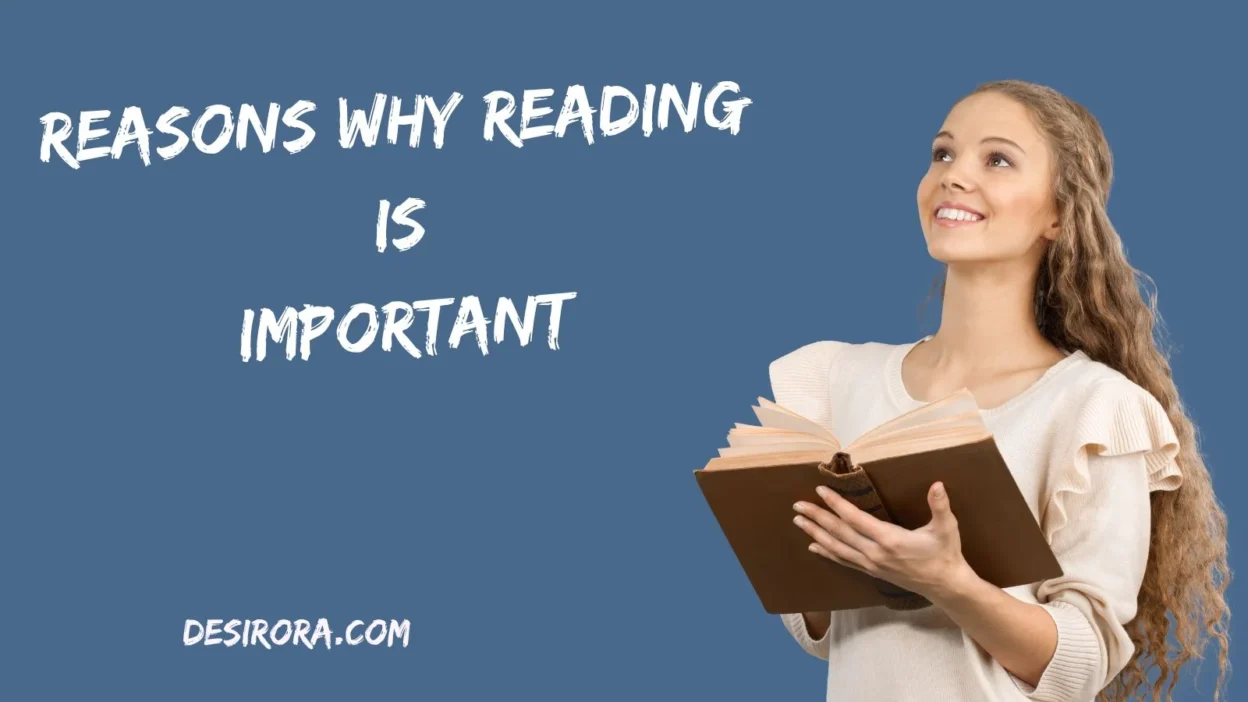In a world full of noise and distractions, reading remains one of the most powerful ways to learn, grow, and connect with ourselves. It’s not just about flipping pages or scrolling through words — it’s about opening new worlds, discovering ideas, and building empathy.
Reading shapes how we think, how we communicate, and even how we see life. Whether it’s a novel that transports you to another world, a biography that inspires you, or an article that challenges your perspective — reading changes you in ways you might not even realize.
Let’s dive deep into the reasons why reading is important, not just for knowledge but for your personal, mental, and social growth.
The Power of Reading in Personal Growth
Reading is like a gym for your brain — the more you do it, the stronger your mind becomes.
When you read, your imagination expands. You begin to see beyond your environment, developing the ability to think creatively and critically. Great thinkers and leaders, from Steve Jobs to Malala Yousafzai, often credit reading as one of their most powerful habits.
How Reading Shapes Your Mind
Books challenge your thoughts. They make you question, analyze, and reflect. When you read a variety of authors and genres, you’re exposed to different viewpoints — and that builds emotional intelligence and maturity.
“A reader lives a thousand lives before he dies… The man who never reads lives only one.” – George R.R. Martin
Building Empathy and Understanding Through Stories
Reading fiction, in particular, helps you understand people’s emotions and experiences. Studies show that people who read literary fiction have higher levels of empathy. It’s like living through someone else’s eyes for a while — and that teaches compassion.
Expanding Imagination and Creativity
From science fiction to poetry, reading stimulates the creative parts of your brain. It fuels innovation by helping you see things from angles you’d never consider otherwise.
Reading and Mental Health
In today’s fast-paced world, reading offers a quiet escape. It’s a form of meditation for your mind.
Why Reading Is a Stress Reliever
According to research by the University of Sussex, just six minutes of reading can reduce stress by up to 68%. That’s because it allows your mind to slow down, focus, and disconnect from anxiety triggers.
Cognitive Benefits: Focus, Memory, and Critical Thinking
Reading regularly improves your concentration and memory retention. It keeps your brain engaged and reduces the risk of cognitive decline as you age.
Reading as a Form of Mindfulness
When you get lost in a book, you’re practicing mindfulness without realizing it. You’re in the present moment, focused, and at peace — which helps improve overall well-being.
Educational Importance of Reading
Education and reading go hand-in-hand. You can’t have one without the other.
Strengthening Vocabulary and Language Skills
Reading introduces you to new words, phrases, and sentence structures. Over time, your vocabulary grows, and your ability to express yourself improves.
| Reading Type | Skill Developed | Example |
| Fiction | Imagination & empathy | “To Kill a Mockingbird” |
| Non-fiction | Knowledge & critical thinking | “Sapiens” |
| Poetry | Rhythm & expression | “The Sun and Her Flowers” |
Boosting Academic Performance
Students who read daily tend to score higher in comprehension and writing tests. It’s because reading enhances both understanding and articulation.
Developing Analytical and Comprehension Skills
Reading trains your mind to find connections, understand context, and spot details — all crucial skills for problem-solving and reasoning.
The Social Benefits of Reading
Reading doesn’t just shape individuals — it connects communities.
How Reading Connects People
Book clubs, online reading forums, and shared discussions unite people with similar interests. It gives you a chance to connect, learn, and grow with others.
Building Communication Skills and Emotional Intelligence
When you read, you absorb not just words but tone, structure, and rhythm. This improves how you express emotions and ideas in real life.
Inspiring Meaningful Conversations
Books introduce ideas worth discussing — from philosophy to love, from politics to art. They make conversations deeper and more thoughtful.
Reading in the Digital Age
The digital revolution hasn’t killed reading — it’s transformed it.
Books vs. Digital Reading: Finding Your Balance
Printed books have a charm that digital screens can’t replace, but eBooks and apps make reading more accessible than ever. The key is balance: use digital tools without losing the tactile joy of paper.
The Rise of Audiobooks and E-Readers
Audiobooks are great for multitaskers. You can “read” while driving, working out, or cooking — turning idle moments into learning opportunities.
How Technology Can Enhance Reading Habits
Apps like Goodreads, Blinkist, or Kindle Unlimited make discovering and tracking books easier, helping you stay consistent with your reading goals.
Reading for Professional and Career Growth
Reading is one of the best investments in your professional life.
Why Successful People Are Avid Readers
Bill Gates reads about 50 books a year. Warren Buffett spends up to 80% of his day reading. Why? Because reading gives you perspective and keeps your mind sharp.
How Reading Broadens Your Perspective
When you read business, psychology, or leadership books, you gain insights that help you make smarter decisions at work.
Staying Informed and Up-to-Date
Reading news, reports, and research keeps you aware of trends in your field — an essential skill in a constantly changing world.
Reading as a Lifelong Habit
The love for reading is something you can nurture at any age.
How to Develop a Consistent Reading Routine
Start small — even 10 minutes a day matters. Keep a book by your bedside or download an eBook on your phone. Replace 10 minutes of scrolling with reading.
Tips to Make Reading Enjoyable Again
- Choose topics you genuinely love.
- Try short stories or graphic novels.
- Join a book club or reading challenge.
Encouraging Children and Teens to Read More
When kids see adults reading, they mimic it. Make reading a shared activity — discuss stories, explore libraries, or set family reading goals.
The Science Behind Reading
What Neuroscience Says About Reading
MRI scans show that reading activates multiple parts of the brain, improving neural connectivity. It’s like giving your brain a full-body workout.
How Reading Improves Memory and Emotional Regulation
When you recall characters or plotlines, you’re strengthening memory circuits. Emotional scenes, on the other hand, train your brain to handle empathy and emotions better.
The Connection Between Reading and Longevity
A Yale study found that people who read books for just 30 minutes a day lived, on average, two years longer than those who didn’t.
Cultural and Emotional Impact of Reading
Preserving History and Culture
Books are vessels of culture, capturing values, beliefs, and stories that define generations. From ancient epics to modern memoirs, reading keeps our past alive.
How Books Shape Societies and Beliefs
Reading educates and empowers societies to think critically and challenge injustices. Many revolutions and movements began with the written word.
Finding Emotional Healing Through Stories
Stories can comfort, inspire, and heal. When we read about characters overcoming pain, it helps us process our own emotions.
Conclusion
Reading isn’t just a habit — it’s a lifestyle, a mindset, and a doorway to endless possibilities. It helps you grow mentally, emotionally, and spiritually. Whether you’re seeking knowledge, comfort, or inspiration, books always have something to offer.
So next time you pick up a book, remember: you’re not just reading words — you’re shaping the person you’re becoming.
FAQs
Why is reading considered essential for success?
Because it develops your critical thinking, creativity, and communication skills — all key traits of successful individuals.
How does reading improve mental health?
It reduces stress, boosts focus, and offers an emotional escape that helps balance your mind.
Is digital reading as effective as traditional reading?
Yes, when done mindfully. Digital reading offers convenience, while print reading enhances focus and retention.
How can I develop a daily reading habit?
Set realistic goals, carry a book everywhere, and read a few pages daily — consistency matters more than duration.
What are some of the best genres to start reading for self-growth?
Try biographies, psychology, self-improvement, and fiction — each offers unique life lessons.

Aldous Huxley was a visionary writer and philosopher whose works explored human nature, consciousness, and the future of society. His ideas continue to challenge minds and inspire generations.



